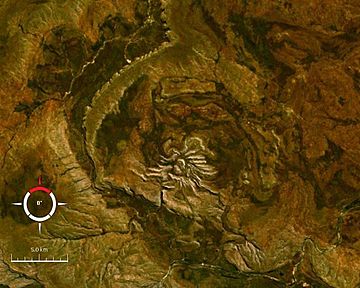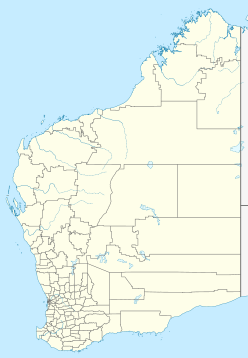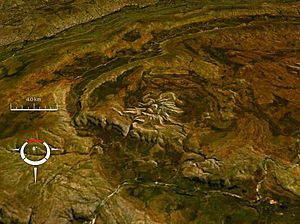Spider crater facts for kids

Landsat image of the Spider crater; screen capture from NASA World Wind
|
|
| Impact crater/structure | |
|---|---|
| Confidence | Confirmed |
| Diameter | 13 km (8.1 mi) |
| Age | >550 Ma Precambrian |
| Exposed | Yes |
| Drilled | No |
| Location | |
| Location | Kimberley |
| Coordinates | 16°44′22″S 126°5′25″E / 16.73944°S 126.09028°E |
| Country | Australia |
| State | Western Australia |
The Spider crater is a very old and worn-down impact structure in the Kimberley area of northern Western Australia. It is about 18 kilometers (11 miles) east of the Mount Barnett Roadhouse. This place is very hard to reach because the land is rough and rugged.
The crater gets its name because it looks like a spider from above. You can see long, thin ridges of rock called quartzite spreading out from the center. These look just like a spider's legs on satellite images.
Contents
What is the Spider Crater?
Scientists have been curious about this unusual rock formation since the 1950s. For a long time, they didn't know what it was.
How it was Discovered
In the late 1970s, scientists found special rocks called shatter cones in the middle of the area. Shatter cones are cone-shaped rocks that only form when a very strong shockwave passes through them. This usually happens during a huge impact, like a meteorite hitting Earth.
Finding these shatter cones helped scientists realize that the Spider structure was actually an old, eroded impact crater. It was formed when a large space rock crashed into Earth a very long time ago.
Size and Shape
The central part of the crater, where the shatter cones were found, is thought to be what's left of a "central uplift." This is a mound that forms in the middle of a large crater right after an impact.
The area that was affected by the impact is about 11 by 13 kilometers (6.8 by 8.1 miles) wide. The original crater might have been even bigger before it was worn away by weather over millions of years.
The crater isn't perfectly round. Some scientists think this uneven shape means the space rock hit the Earth at a very low angle. It might have come from the north or northwest. Other scientists believe the uneven shape could be partly because of the hills and valleys that were already there before the impact.
How Old is the Spider Crater?
It's hard to say exactly when the Spider impact happened. Scientists believe it occurred after the rocks in the area had gently folded, but before a time when glaciers covered the region.
If this is correct, the impact happened between 900 million and 600 million years ago. This time period is known as the Neoproterozoic Era.
 | Frances Mary Albrier |
 | Whitney Young |
 | Muhammad Ali |



